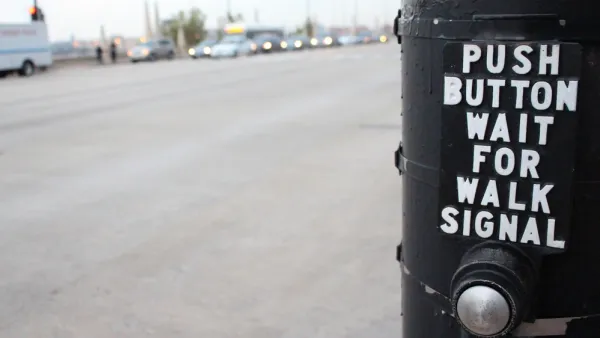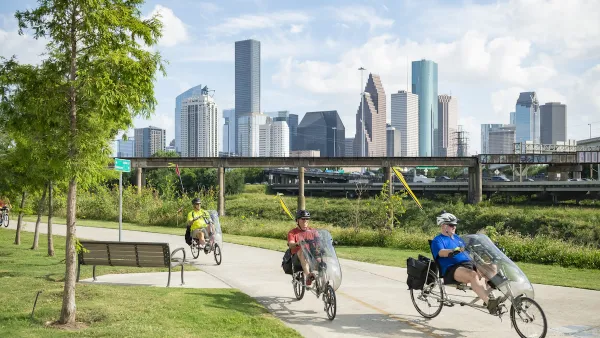A well-informed, social media savvy observer is shedding light on a seemingly small change with big impacts on the quality of life available to pedestrians along Oakland's streets.
"Crossing the street in Oakland’s Rockridge District just got a lot more difficult due to 'improvements' by the City’s traffic engineers," according to a post on the Gjel Accident Attorneys blog. The blog post follows on the legwork done by Eric Fischer, a name familiar to Planetizen readers, who has taken to Twitter in recent weeks to call attention to the changes.
"As Mr. Fischer notes, it now can take as long as 2 minutes and 35 sections to cross the intersection of College, Hudson, and Manila. Prior to the new signal timing, it took less than one minute," according to the post, which adds the example is not the only such reconfiguration of priorities on the street's of Oakland. "While this intersection serves one of the most striking examples, these pedestrian-unfriendly signal changes are occurring throughout College Avenue and across Oakland."
The change stems from a citywide implementation of "actuated signals" (also known by some pedestrian advocates as "beg buttons"). The application of technology to engineering standards are why the case study is so releveant:
"Across Oakland, pretimed signals are being converted to actuated signals due to misguided applications of traffic engineering requirements. New guidelines require cities to install accessible pedestrian signals (push buttons) as a means of providing audible feedback for visually impaired users. San Francisco has fulfilled these requirements by installing push buttons with the pedestrian phase on recall, meaning the pedestrian phase still defaults to a “Walk” signal and continues operating as before. In contrast, the result in Oakland has been a mass-conversion to actuated signals, and significantly longer wait times for pedestrians in many high-volume areas."
The article goes on to examine the potential of increased pedestrian jaywalking as they encounter longer wait times and also more discussion of the importance of such technological choices to larger goals of walkability and quality of life.
FULL STORY: Oakland’s walkability threatened by misguided traffic engineering

Analysis: Cybertruck Fatality Rate Far Exceeds That of Ford Pinto
The Tesla Cybertruck was recalled seven times last year.

National Parks Layoffs Will Cause Communities to Lose Billions
Thousands of essential park workers were laid off this week, just before the busy spring break season.

Retro-silient?: America’s First “Eco-burb,” The Woodlands Turns 50
A master-planned community north of Houston offers lessons on green infrastructure and resilient design, but falls short of its founder’s lofty affordability and walkability goals.

Test News Post 1
This is a summary

Analysis: Cybertruck Fatality Rate Far Exceeds That of Ford Pinto
The Tesla Cybertruck was recalled seven times last year.

Test News Headline 46
Test for the image on the front page.
Urban Design for Planners 1: Software Tools
This six-course series explores essential urban design concepts using open source software and equips planners with the tools they need to participate fully in the urban design process.
Planning for Universal Design
Learn the tools for implementing Universal Design in planning regulations.
EMC Planning Group, Inc.
Planetizen
Planetizen
Mpact (formerly Rail~Volution)
Great Falls Development Authority, Inc.
HUDs Office of Policy Development and Research
NYU Wagner Graduate School of Public Service




























